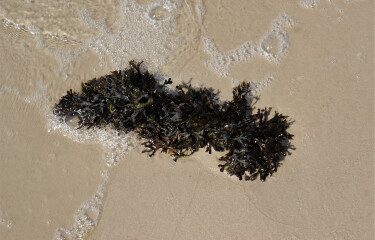SeafoodSource is closely following seaweed innovation by compiling a regular round-up of updates from the sector.
- Kerala, India-based Central Marine Fisheries Research Institute (CMFRI) announced that two of its seaweed-based products will hit the market soon.
CMFRI signed a license agreement with Pioneer Pharmaceuticals, a Kochi, India-based wellness commercialization and production company, for the seaweed-based products, one of which aims to increase antiviral immunity and the other will combat high cholesterol or dyslipidemia, the institute said in a release.
"Cadalmin antihypercholesterolemic extract, or Cadalmin ACe, has proved to be a natural remedy to combat dyslipidemia and hypercholesterolemic disorders. Dyslipidemia is the presence of high levels of cholesterol in the blood." CMFRI Head of Marine Biotechnology, Fish Nutrition and Health Kajal Chakraborty said. "This was developed using seaweed concentrate with anti-dyslipidemic activities following a sequel of purification steps."
The products contain natural marine bioactive ingredients from seaweed species that are commo near Indian coastal waters.
- Seaweed will be harvested for the first time from the Denmark-based Kriegers Flak offshore wind farm in the Baltic Sea.
The initiative is a part of a collaboration with the WIN@sea project and will also entail setting mussel lines at the farm and making an assessment of cod stocks around the farm, according to ReNews.Biz.
“It’s going to be an exciting year for us. One of the big milestones will be our initial harvest of seaweed for food production from the offshore wind farm in late spring," Aarhus University Senior Researcher and WIN@sea Project Leader Annette Bruhn said. "We are working to produce both fossil-free energy and sustainable food from the sea in the same place whilst providing data for environmental monitoring, ... documenting effects on the marine environment and biodiversity."
The team involved will also investigate the effects man-made reefs have on surrounding biodiversity.
- Port Lincoln, Australia-based Port Lincoln Tuna Processors has decided to turn native seaweed into fertilizer, chicken feed, and a lucrative food pigment as part of a collaboration with the South Australia government and Dinko Tuna finfish aquaculture site.
The seaweed will be converted through a zero-waste process, and among its many intended uses, the food pigment in particular has fetched prices of around USD 250,000 (EUR 230,000) per kilogram globally, according to ABCNet News.
"We know there's a huge demand for seaweed and fish-based fertilizer around the world; in fact, it's expected to double by 2031, so this is a big economic opportunity," South Australia Primary Industries Minister Clare Scriven said.
The project began as a way for Dinko Tuna farmers to optimize their tuna aquaculture site all year round and fill the void after the fish were harvested in the winter.
"When you co-cultivate this next to tuna farms or finfish farms, there is a significant environmental benefit because it is assimilating all the nitrogen, carbon, and phosphorous that is potentially discharged from these farms," South Australia Research and Development Institute Aquaculture Leader Sasi Nayar said. "And, it goes toward biomass which can be used for a variety of applications – whether it's for food, for feed, for fertilizer, or a whole other raft of opportunities that comes with the utilization of the seaweed biomass."
Photo courtesy of ABARONS/Shutterstock







